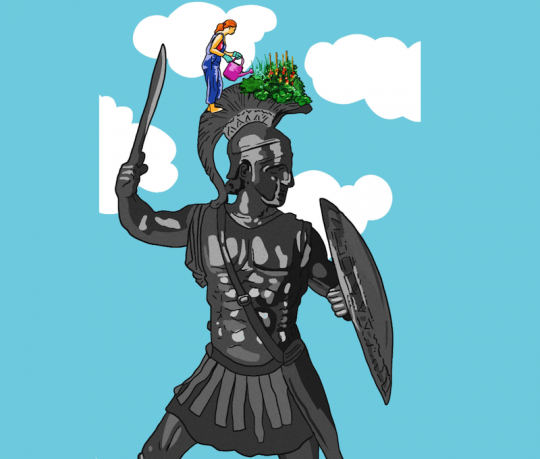Courage of everyday life

I drove my friend to rehab in a closed facility: a hardcore one, three months long, with contact with the outside world allowed only after a few weeks. I remember that at the entrance they took his phone and his books. He had two: one detective story, the other was Awaken the Giant Within by Tony Robbins, an American self-made guru who unfortunately looks like he managed to awaken the giant within him. My friend Staś, about 5 feet high, with his vintage look and life shattered into pieces and this book in his plastic bag, crumpled, read by others who had also been trying to become giants. I waited a while for the formalities to be completed, took this book in my hand, and opened it at a random page. If you wanted to, you could be feeling real ecstasy right now, I read. I laughed bitterly.
I think what pisses me off the most is the clichés “You can do anything!”, “Reach for the stars!”, “Sky is the limit!” – maybe It’s because I have painfully experienced that it was simply not true. Anyway, not true for me. What’s more, when I look at those who, with a smile, in a nude-style make-up, put their flags at one more peak, I feel a little jealous, a little disbelieving and a little lonely. Am I the only one who cannot make it; am I the only one who cannot run that fast uphill and reach for the stars? Who cannot boldly go into the unknown every day in spite of the wind blowing in my face?
Yet the word ‘courage’ stirs my heart; I need to find my own understanding of the word. However, I think of it differently than in these war and race terms. I am closer to Brené Brown who, defining the English word courage, writes as follows: “Courage is a word that has a heart. Its root is cor, which means heart in Latin. In its first sense, the word courage meant to express one's position, giving expression to one's heart.” Over time, the definition has changed; today, we generally associate courage with heroic, bold actions. But in my opinion, this definition does not contain the inner strength and passion needed to speak openly and honestly about who we are, about the good and bad experiences of our lives. Speaking from the heart is what I call “the courage of everyday life.” Hell yeah, Brené!
Not that I do not believe in bravery – great heroic deeds, unambiguous resolutions, gestures immortalized later on monuments that we, the so-called ordinary people, pass by. But I also believe in something else, some feminine kind of bravery – the courage to face everyday life, the quiet heroism of women changing diapers of their sick mothers every day in the next room, the heroism of single parents who help their children with biology, or by sewing a hole in their socks whilst barely keeping their eyes open; the courage to cross an invisible threshold at a meeting at work when we dare to share what we think, knowing that others will remain silent, even though they feel the same way. The courage of everyday life is not in the history books. But this is what makes the fabric of life.
A few months ago, it turned out that we are mortal. I mean, some of us knew that before, but a lot of us, in some respects, did not. Some of us, supported by energy drinks, painkillers, the sight of shiny muscles of a personal trainer shouting at them, managed to navigate through their days with a sense of omnipotence. Wasn’t I like them? On a page of my calendar from the beginning of April, I see a lot of meetings and events, then crossed out in yellow crayon; next to it, I wrote “When you want to make God laugh, tell him about your plans”.
Someone bigger than us took a deep breath, blew, and knocked over the blocks of our lives. Not everyone – but most of us look into the eyes of uncertainty – or maybe it looks into our eyes, like figures from portraits whose sight cannot be escaped.
What can we do to go with courage, through a time where it seems that nothing is certain and we are fragile? I have come up with a few tips for myself. Their essence is balancing between this ambitious, determined piece that wants to act, to cross borders, to expose itself to what is difficult for me, to abandon what has turned out to be dispensable, and to go towards what's calling me – and I have respect for this entirely different piece – the fragile and frightened one which, like a little child, screams to me: do not go there, it is not safe! Not all my movements must have a dash of a cavalry sabre. I do not have to sell a mortgaged apartment and move to a mountain chalet on an alpine pasture to change my life. And I can think that on Wednesdays, Thursdays and Saturdays I will be a little brave, and the rest of the week I will be resting from courage. That is enough. Writer and, as she puts it, entrepreneur and introvert Mary Anne Radmacher once wrote, “courage doesn't always scream, sometimes courage is a quiet voice that says at the end of the day, I'll try again tomorrow.” I would rather have that quiet voice than a giant screaming.

